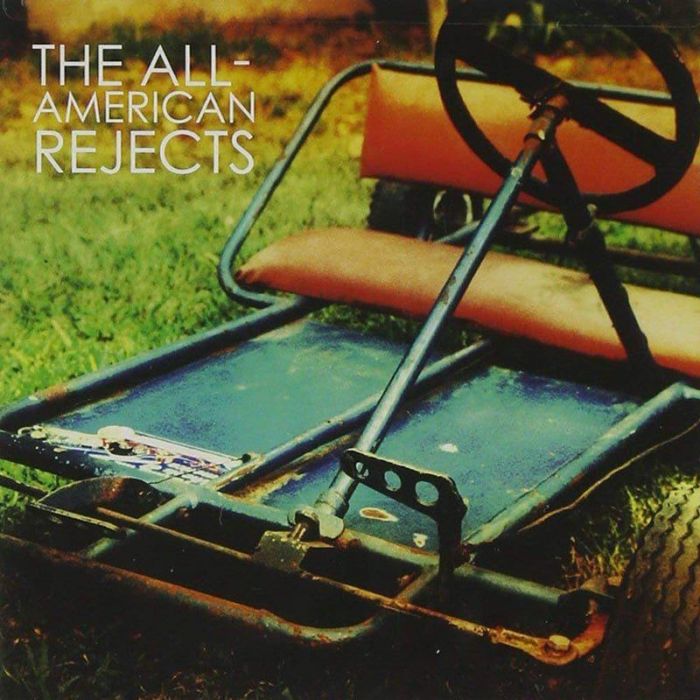The All-American Rejects by The All-American Rejects (Review)

I have this theory about bands. Most of the time, you can decide if you’ll like one or not based simply on your reaction to their name and/or their photo. That sounds shallow, but it’s really not so lame as it sounds. Art is all-inclusive, so it’s not that difficult to believe that a band’s sound will influence their image and how they convey themselves (and vice versa, sometimes unfortunately). Of course, there are always exceptions — what was your first reaction to The Silver Mt. Zion Memorial Orchestra and Tra-La-La Band? — but if you want proof, you should just browse through my “Why in the hell did they send that to me?” pile.
Let’s apply this theory to The All-American Rejects, shall we? First, let’s start with the name. “The All-American Rejects” sounds just a little too obvious (pretentious) an attempt to come across as heartbroken and winsome. In reality, it’s just a self-deprecating wink. This sort of name should only be reserved for the backing bands of gloom merchants who have paid their melancholy dues, and frankly, I don’t think Mark Eitzel is listed anywhere in the credits.
And now the picture. Ah yes, the classic “Stare Off Into The Distance With A Profound, Lonesome, and/or Slightly Pouty” gaze. Why do bands still insist on doing this? Maybe it’s just my friends and I, but everyone I know mercilessly lampoons this at parties, and yet I still see every “indie” band strike that pose. I’m not singling out the Rejects here, but let’s face facts… staring off into the distance with a blank look, or making it obvious that you are ignoring the camera, does not equal profound.
So what does all of this say about their music? Well, let’s see… we’ve got a self-deprecating bandname that tries too hard and a photo that was clichéd the moment it was taken. Yep… pretty much sums up the music.
In a world where “indie” music is dominated by the likes of Dashboard Confessional and Jimmy Eat World, The All-American Rejects fit in just fine. It’s a little punk (but not too much), with some safe mall emo, a cheeky ’80s glam-rock solo or two that Weezer rejected, and plenty of studio sheen. Throw in some drum programming for that little extra edge, and presto!
As for the lyrics, what would you expect from titles like “My Paper Heart,” “One More Sad Song,” and “Don’t Leave Me”? Heartbreak, heartbreak, and more heartbreak. You have to give the boys an A for effort, because this is about as earnest as you can get. With lyrics like “Please just don’t play with me/My paper heart will bleed/This wait for destiny won’t do/Be with me please I beseech you,” they make Chris Carabba look like that bully who picked on you in junior high gym class. But the catch is that it’s so produced that any emotion feels completely forced. When Tyson Ritter’s voice cracks on the album (and it cracks a lot), it’s done so perfectly you’d swear it was planned.
There are some good moments on the disc, but they are few and far between. The chorus on “Your Star,” with its soaring guitar and keyboards, may be the album’s finest moment (especially since they actually bolster the earnest vocals). Here, the Rejects’ formula actually works… for about 30 seconds. “Swing, Swing“ ‘s melody is bouncy enough, and I even found myself nodding along, especially on the chorus. In fact, the song very nearly survives the chorused guitar solos (again with the 80s homage!). Nearly. “One More Sad Song” actually hearkens back to Weezer’s finest moments in its opening seconds, before it devolves into something more Sum 41 than anything else.
But still, trying to pick out individual tracks is mostly an exercise in futility. The healthy slathering of studio polish, typified by the tepid drum programming and bubblegum melodies, guarantee that the album is nothing if not consistent. But the lack of rough edges (cracking voices don’t count) means there is nothing on this album that catches you, nothing to generate any sort of emotional response — unless you’re in this album’s target audience of MTV-obsessed girls, ages 13 – 18.
And there’s practically nothing to jar you out of the overall blandness that this album seems to pursue with such dedication.
As some of you have kindly pointed out, the band changed the artwork they were using for this album, and so I’ve updated the page accordingly. While it does invalidate part of the review (no more “gazing off in the distance” jokes), it really doesn’t change my opinion of their music.